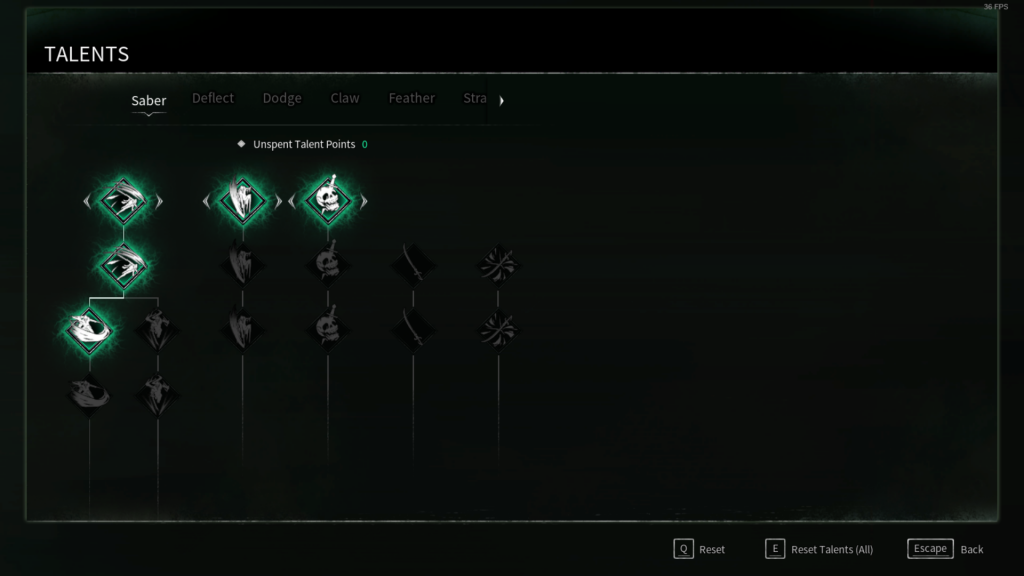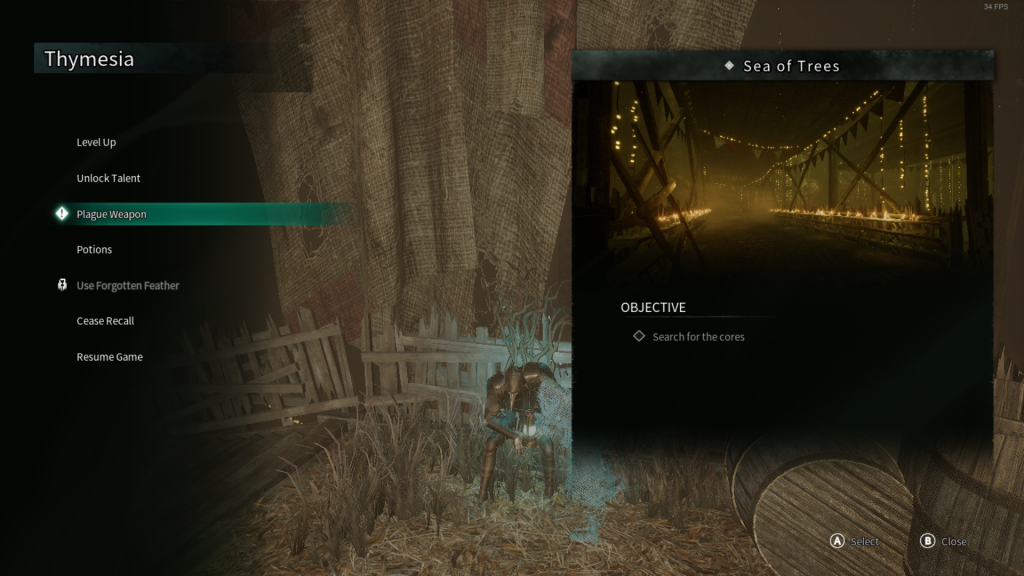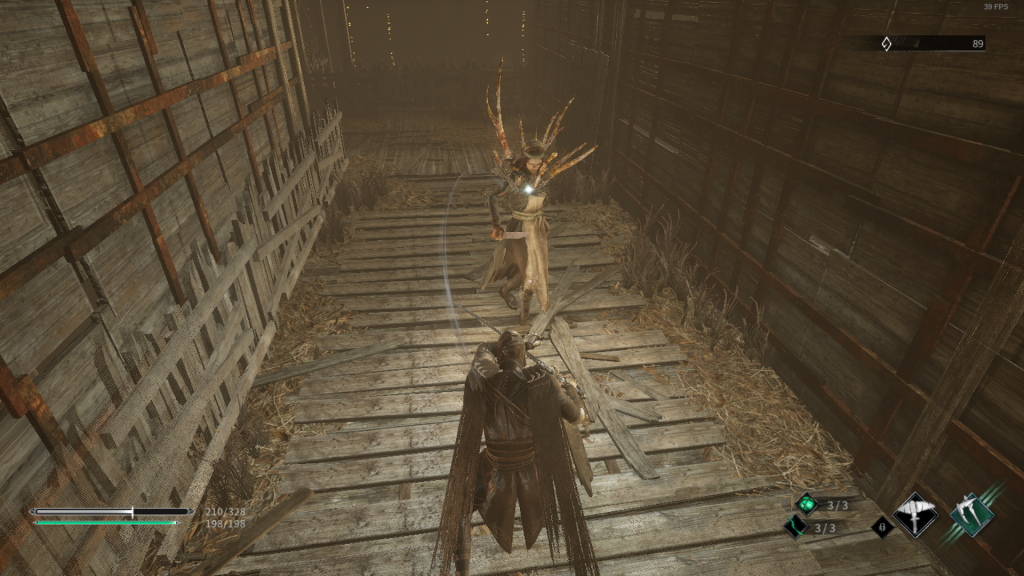Ever since FromSoftware’s rise to stardom with the Demon and Dark Souls series, plenty of studios have attempted at trying to emulate the franchise so beloved by its fans. While we have observed a couple of successful entries in the genre, like Mortal Shell, the general consensus is that it is very tough to match FromSoft’s formula, remain original and still deliver a great experience on top. Thymesia is another game which tries to match the Souls experience and although it does have great aspects, it remains to be seen if it will break through the genre.
Thymesia puts you in the shoes of Corvus, a mysterious character thrown into the chaos in Hermes, a kingdom in ruin after the effects of a calamity which turned its citizens into abominations; monsters whose only care is to feast on other living things, with the protagonist being the most appetizing target in all of the land. Corvus is the last hope for the Kingdom and will employ a variety of tools to achieve this goal.
In Corvus’ wake, there will be a number of tough enemies, against which he cannot hold back on his powers. This is why the game provides you with a large number of customizability options, through the skill trees, which permit players to really change their playstyle according to how they like best. The categories dictate what every tree will specialize in, and Talent Points can be spent to unlock the different skills along these different categories. These points are earned when levelling up, which means that earlier on players will get the opportunity to allocate a good number of these skills, which may prove to be vital for progression.

Plenty of skills are unlocked by one point, which makes them pretty affordable as well. The best part of the skill allocation is the ability to reset the Talents, free of charge, to re-distribute them however one may like. Over and over! This is one of the two core mechanics in Thymesia, as this allows players to change their style on the fly, shifting between defensive or aggressive stances in whenever players find the save point.
These skills may vary from sword combo extenders, adding a couple of additional hits to your Saber strikes, to affecting your attack and defence modifiers after a successful Predator Claw attack. Speaking of, the Claw attack is another big aspect of Thymesia, which gives the game its defining mechanic to steal your enemies’ attacks and use them against them. Every enemy has a different attack which may be stolen, and these are stored in slots which you can then use and consume. There is a limit to how many attacks you can steal from enemies at a time, but no actual limit to how many times you can steal, so if your attack is not lethal, just steal it back and strike again!
Speaking of the Claw attack and combat brings us to another mechanic in Thymesia, that of the health bar. This is because HP is not the same as in other games, because of the two types of damage that Corvus can inflict. Regular attacks inflict Wounds rather than damage, which instead of draining the life bar of enemies, turns it green. This green HP, Wounds, has to then be taken out by Claw attacks, otherwise, it will regenerate after some time, healing the enemy back. The other type of attacks, using the Plague Weapons you steal or farm (later below) from enemies, inflict direct damage to opponents which can’t be healed, which makes them good moves to chip away at boss enemies’ lives.

Plague Weapons are attacks which you can steal from enemies using the Predator Claw attack. These attacks can also be unlocked and equipped by Corvus by picking up skill shards, dropped by enemies. These skill shards are used to power up the attack as well, giving them extra properties like more damage or reduced damage while the attack is hitting.
Farming skill shards is beneficial so that you can power up the chosen weapon attack through these additional properties to make it an even better tool for your arsenal. Personally, I am not a big fan of the standard saber attacks being wound damage instead of the actual damage, since it is not an attack relying on plague or wound damage but an actual sword. I would rather have the Plague Weapons doing wound damage since, after all, they ARE plague-based damage.
Combat is surely a big part of Thymesia, but so is defence. Corvus has a parry which can be used to deflect attacks, which is quite strict on timing but with practice, it becomes second nature. There is also a skill which converts the parry to an actual block, where you will take much-reduced damage from enemy strikes. This is very useful in boss fights to minimize their damage, but one needs to keep in mind also the unblockable attacks, which occur when enemies flash red. The Feather parry mechanic then comes into play, where one needs to react to the red flash by throwing the feather to stop them in their tracks. Failure to do so in time will result in Corvus eating a big chunk of damage, so reactions are tested quite a lot in Thymesia.
These feathers are unlimited, although there is a maximum number one can have at a time, and replenish over time, so there is no need to worry about picking stuff up. Using them in offence is not recommended much since they do minimal wound damage, but using them while making sure to keep at least one in reserve is definitely a viable strategy to wring out as much damage as possible from enemies.

Thymesia is a solid entry in the souls-like genre, but it still feels like it lacks some consistency to really break out of its shell. There is no big sense of direction to where you’re going so it can feel like you are lost most of the time. Feather parries feel also like a gamble, as it is not the first time a fullscreen red attack should have been parried but the feather misses. It is these details which, coupled with the trial and error core concepts of being a soul-like, that prevent it from standing out and living up to its full potential because other than that, OverBorder Studio has really crafted an original title with an interesting story.
This story is also scattered all throughout the game for players to find, unravel and piece together to create the lore of what happened to the city. It really gives an insight as to what is happening during these plague times, and the way it is implemented in the game is really nice.
All in all, Thymesia is a great effort from a team on their first-ever foray into the gaming world. It tries to force its way into the souls like genre through an original title, and does surprisingly well all things considered. The game’s unique plague mechanics surely give it a very interesting edge in combat, and the eerie setting and smart lore placement gives the title a great atmosphere to experience first hand.
Thymesia is available to purchase on Steam right now!
And for more gaming news and reviews, be sure to check out our section HERE!